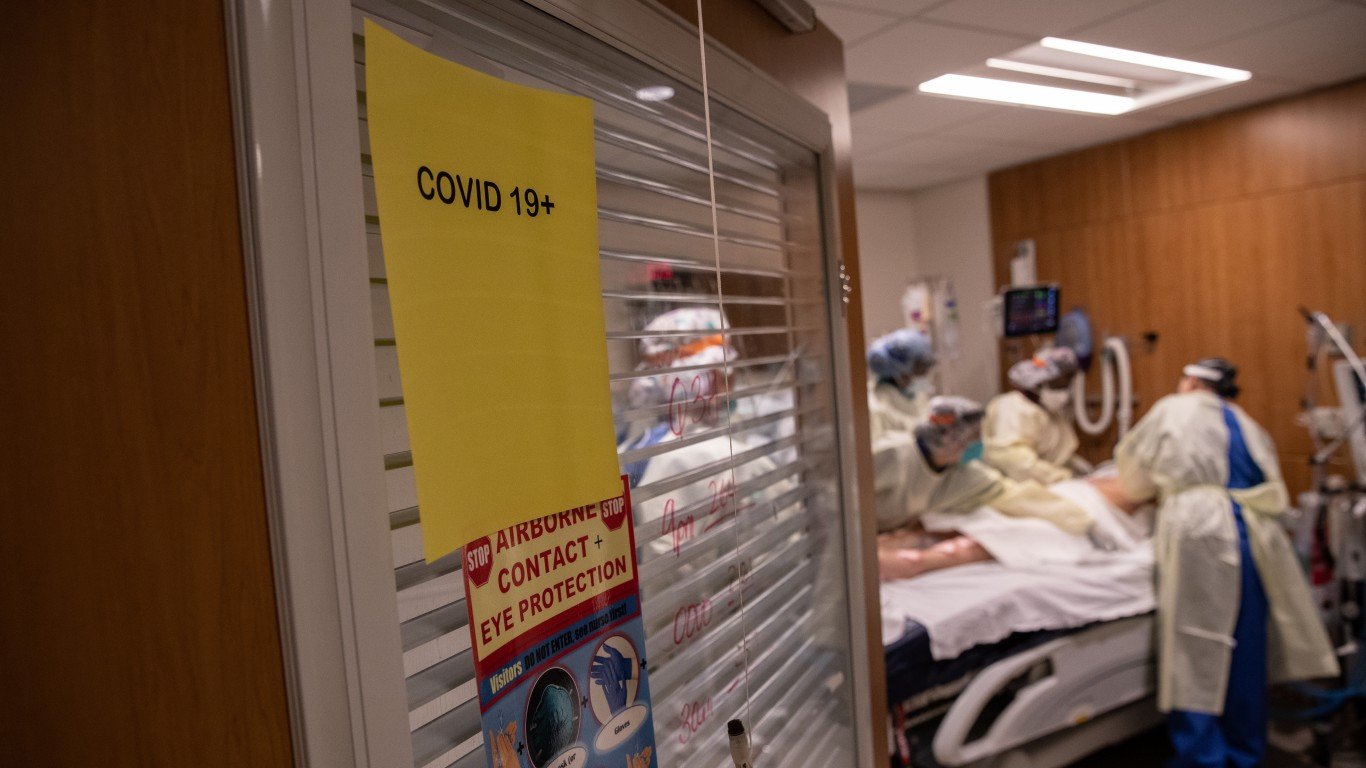

The U.S. reported over 700,000 new cases of coronavirus over the seven days ending May 22, bringing the total count to more than 82.1 million confirmed cases of COVID-19. There have been more than 993,000 COVID-19-related deaths — the highest death toll of any country.
New cases continue to rise at a faster rate. In the past week, there were an average of 29.3 daily new coronavirus cases per 100,000 Americans — an increase from the week prior, when there were an average of 22.7 daily new coronavirus cases per 100,000 people.
While new data shows that the risk of contracting COVID-19 is high in almost every part of the country, cities continue to be the sites of major outbreaks and superspreader events. Experts agree that the virus is more likely to spread in group settings where large numbers of people routinely have close contact with one another, such as colleges, nursing homes, bars, and restaurants. Metropolitan areas with a high degree of connectivity between different neighborhoods and a large population may be particularly at-risk.
In the 50 largest metro areas, the incidence of COVID-19 grew at an average rate of 30.6 new cases a day per 100,000 residents in the past week — 11.1% greater than the case growth in all counties outside of metro areas.
The Decatur, AL metro area consists of Morgan County and Lawrence County. As of May 22, there were 28,833.5 confirmed cases of COVID-19 per 100,000 Decatur residents, 13.4% higher than the national rate. For comparison, the U.S. has so far reported 25,431.1 cases per 100,000 Americans nationwide.
The incidence of coronavirus cases depends on a variety of factors and can vary even between neighboring counties. Within the Decatur metro area, Morgan County has the highest incidence of COVID-19 cases. As of May 22, there were 30,375.9 cases per 100,000 residents in Morgan County, the most of any county in Decatur, and far greater than the county with the lowest incidence. In Lawrence County, there were 23,271.2 cases per 100,000 residents — the least of any county in Decatur.
In order to slow the spread of COVID-19, city and county governments have ordered the closure of thousands of consumer-facing businesses. These measures have led to widespread job loss and record unemployment. In the Decatur metro area, unemployment peaked at 12.0% in April 2020. As of November 2021, the metro area’s unemployment rate was 2.4%.
To determine how the incidence of COVID-19 in the Decatur, AL metro area compares to the rest of the country, 24/7 Wall St. compiled and reviewed data from state and local health departments. We ranked metro areas based on the number of confirmed COVID-19 cases per 100,000 residents.To estimate the incidence of COVID-19 at the metropolitan level, we aggregated data from the county level using boundary definitions from the U.S. Census Bureau. Population data used to adjust case and death totals came from the U.S. Census Bureau’s 2019 American Community Survey and are five-year estimates. Unemployment data is from the Bureau of Labor Statistics and is seasonally adjusted.
| FIPS | MSA | Population | Confirmed COVID-19 cases as of May 22 | Confirmed COVID-19 cases as of May 22 per 100,000 residents | Cumulative COVID-19 deaths as of May 22 | Cumulative COVID-19 deaths as of May 22 per 100,000 residents |
|---|---|---|---|---|---|---|
| 19460 | Decatur, AL | 152,271 | 43,905 | 28,833.5 | 678 | 445.3 |
| 11500 | Anniston-Oxford, AL | 114,618 | 32,498 | 28,353.3 | 627 | 547.0 |
| 13820 | Birmingham-Hoover, AL | 1,085,330 | 305,806 | 28,176.3 | 3,796 | 349.8 |
| 23460 | Gadsden, AL | 102,748 | 28,795 | 28,024.9 | 651 | 633.6 |
| 22520 | Florence-Muscle Shoals, AL | 147,327 | 40,602 | 27,559.1 | 659 | 447.3 |
| 46220 | Tuscaloosa, AL | 250,681 | 68,277 | 27,236.6 | 1,044 | 416.5 |
| 33660 | Mobile, AL | 430,655 | 117,146 | 27,201.8 | 1,712 | 397.5 |
| 19300 | Daphne-Fairhope-Foley, AL | 212,830 | 55,960 | 26,293.3 | 681 | 320.0 |
| 33860 | Montgomery, AL | 373,544 | 97,344 | 26,059.6 | 1,588 | 425.1 |
| 26620 | Huntsville, AL | 457,003 | 115,832 | 25,346.0 | 1,263 | 276.4 |
| 20020 | Dothan, AL | 148,252 | 36,920 | 24,903.5 | 746 | 503.2 |
| 12220 | Auburn-Opelika, AL | 161,152 | 37,944 | 23,545.5 | 341 | 211.6 |
Take This Retirement Quiz To Get Matched With An Advisor Now (Sponsored)
Are you ready for retirement? Planning for retirement can be overwhelming, that’s why it could be a good idea to speak to a fiduciary financial advisor about your goals today.
Start by taking this retirement quiz right here from SmartAsset that will match you with up to 3 financial advisors that serve your area and beyond in 5 minutes. Smart Asset is now matching over 50,000 people a month.
Click here now to get started.
Thank you for reading! Have some feedback for us?
Contact the 24/7 Wall St. editorial team.



